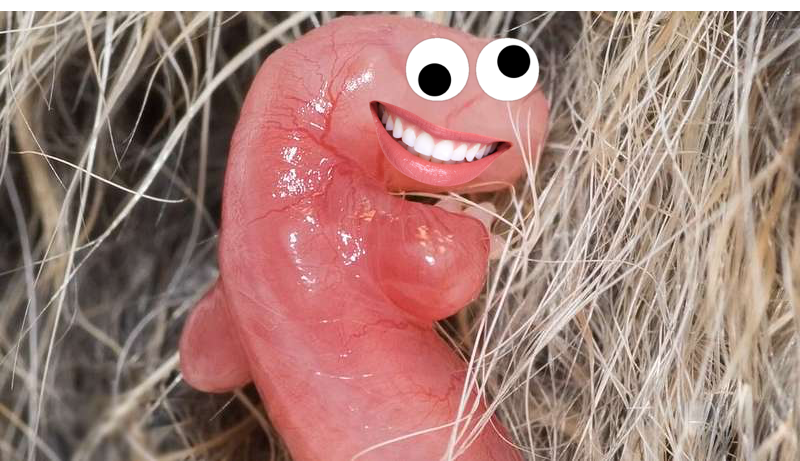Extinction Is Bad
Not me thinking extinction is bad 😂
Quick Plug: We’re hosting a comedy show tonight (Apr 2, 2021) at 7pm EST on this new platform called BRAMBLE. Click here for details and tickets!
In the first few minutes of the excellent 2002 BBC documentary series The Life Of Mammals, a kangaroo gives birth.
For those too squeamish to watch, it’s truly a fucking moronic way to go about giving birth. Just pure idiot brain. First, the mom shits out a little bag of cells that looks like a worm. Then, this thing has to climb upwards, completely blind, towards the mom’s stinky pouch hole, and then just live inside that and get its succ (milk) on. Some months later, it pops out, looking a little more normal. It’s The Marsupial Way, and it’s objectively pretty dumb.
They’re the object of fascination by children, zoologists, and hunters the world round, but in general, wild animals are not much more than a passing curiosity to most adults. They’re beautiful, sure, and yes we should protect them, and yes we should be kind and good and generous, for we are the Apex species, and if we so chose, we could completely wipe them all out.
We have successfully abstracted away the “handling” of wild animals to organizations and institutions specifically devoted to doing so. The oldest human tradition, that of sharing our physical space on Earth with equally evolved, if not as specifically intelligent, species, has come to an end. It’s almost impossible to understand the impact of an animal like a lion, which permeates all of Eurasian culture for thousands of years. Now, the once-mighty and powerful species is relegated to fighting for scraps in areas specifically designated by us for their protection. There are about 20,000 lions left on Earth. That number shocked me when I first heard it; I knew they were endangered, I didn’t realize it was that bad. 12 times that number of humans live within one mile of me. They’re dangerously close to the precipice, the verge, of the worst fate any species can face.
Extinction.
The idea of extinction is bone-chilling. It speaks to some sort of gaping void at the center of existence. It’s the biological Schwarzchild Radius, the point of no return. Extinction seems cataclysmic, and I think we’re all taught to think of it as a sort of “asteroid event,” but it’s happening every day, its long, spindly, bony fingers reaching across the globe and throttling species after species as they sleep. It’s an obvious ecological reality of the world—species went extinct long, long before we came around, and will continue to go extinct even after we too have gone gentle into that good night. So why does it feel so wrong when things go extinct because of something we’ve done? And is the feeling of it being wrong, which, fundamentally, is sort of all we have, enough to make us really want to do something about it?
I thought to myself recently, How far would I go to prevent a species from becoming extinct? The answer is easy for something like elephants or lions. I would literally lay down my life to prevent elephants and lions from becoming extinct. I find the thought of a world without elephants and lions completely unbearable. I love elephants and lions. But if someone told me, “You have the chance to prevent this tiny little shitty little beetle from going extinct, but it would probably be hard and annoying and take some time,” I frankly have no clue what I would do, and I guess lots of people make that choice every day when choosing to chop down swaths of the Amazon for Jair Bolsonaro’s teak Fleshlight display case.
Extinction is literally the worst thing that can happen to a species, with long-lasting and far-reaching ecological consequences, and I still am a little shitty about preventing it if it causes me some personal inconvenience.
It seems like the general conservative and neoliberal viewpoint on something like this is, “Why care about anything that is not a person,” which I find immensely upsetting and disheartening. How can we define who we are as a species without peers to define ourselves against? There are obvious practical and physical reasons for preventing extinction on a massive scale, but why is the emotional appeal so often ignored? Extinction is immeasurably sad. Instead of trying rationalize that pain away, why don’t we lean into it?
Nabeel’s Footnote
I am decidedly not a dog person, but everyone relax—if dogs were about to go extinct, I would probably do something about it. If there were, like, a rally, I would go to it. For sure.
But think about how much dog shit would be left behind…if there were a rally to prevent dogs from going extinct? And everyone brought their dogs? Just something to think about. I promise I would go. But maybe just think about that. Shit on the streets. Seriously, I would. I would not let dogs go extinct.




